The post When Kid Coders met Robots at the Kid-Powered Workshop 2019: Meet Code in the Community Alumni Yi Kai and Sanjit appeared first on Saturday Kids | Coding, Digital Literacy for Kids & Parents.
]]>Over the 3-day workshop, we got to speak to budding roboticists – Yi Kai and Sanjit – who at 11 and 10 years old respectively, were 2 of the youngest participants at the workshop. Find out what they have to share about learning to code and tinkering with robots.


Hey boys! How was your experience learning to code with Python at Code in the Community?
Sanjit: “I learnt the basics, like how to draw pixels, how to write the program and how to use the console. It was very fun! The teachers were also kind.”
Yi Kai: “I enjoyed the class because when we learnt how to draw things, we could be creative and draw whatever we wanted. When we started to learn to use the console, we could interact with it and make it say funny things.”
After learning basic Python at Code in the Community, they continued to code at home.
Sanjit: “I made a calculator and a tic tac toe game. I’m also trying to make a social media app, like a messaging app. It works, but it’s only basic.”
Yi Kai: “I tried to code things I learnt in school. So I coded this factor tree where the numbers are on top and the programme would draw the factors. I also made a hangman game with interactive prizes.”
How are you finding the Kid-Powered Robotics Workshop so far?
Sanjit: “I like that there is a competition. Some other competitions that I’ve been to were more like a science fair, which I didn’t like. Also, I went to other competitions previously and didn’t have good ideas and I lost. So I feel like I have to win this competition.
The mentors from ACSI also helped us so that we have enough support.”
Yi Kai: “This program has taught me how to build robots and how to interact with the robot to make it better. There weren’t many materials in the set, so we had to improvise.
I like that this programme lets me use real robots. In my school, we seldom use real robots and use computer programs instead.”


During the workshop, they also faced some challenges. They had to brainstorm ideas to solve the problems they faced.
Yi Kai: “We are a team of 4. So sometimes we all have different opinions and ideas. We don’t know which ideas to choose and we always want to choose our own ideas. So we have to learn to work things out.”
Sanjit: “Also controlling the robot is hard. When you try to pick up the blocks, it tends to fall down.”
What have you learned from this programme?
Sanjit: “You have to listen to others. You can’t only stick to your own opinions forever. You have to consider other people’s opinions because they may be better. For example, this morning, we couldn’t decide who wanted to do the challenge. But in the end, we managed to work it out.”
Yi Kai: “When you do things solo, you won’t have much progress. But if you do it with a partner or a group, the robot will be better because you have more ideas to share.”
Do you know what you want to do in the future?
Sanjit: “I want to do something related to coding!”
Yi Kai: “I want to do something to earn a lot of money so that I can support my family.”



What advice would you give fellow kid coders?
Yi Kai: “I’d advise the kids to just try out whatever blocks they can. You can take someone else’s program and see how it works. You remove a few blocks and try to figure out what will happen after that.”
Sanjit: “Don’t give up after the lessons. Continue at home, do a Google search for ideas. There are also some library books that are useful. A very good author for this is Carol Vorderman. Her books taught me how to code in even before I joined Code in the Community.”
. . .
The Kid-Powered Workshop culminated in matches between the teams’ robots. The competition was fierce, with robots pushing and shoving each other while teams cheered their friends on. While there might have only been one winning team in the strictest sense of the word, seeing the kids cheer each other on and help each other out was what made us, as hosts, feel like this was a success.
Thanks to Google Singapore, VEX Robotics, and the REC Foundation who made this robotics workshop possible and enabled our Python grads to learn about a different side of coding and tech. We believe that it’s important to continue providing opportunities to students beyond the classroom – if you’re keen to support more initiatives like this to level the playing field for under-privileged children, drop us an email at hello@saturdaykids.com or sign up to volunteer for Code in the Community, our multi-level programme providing free coding classes in Scratch and Python to kids from disadvantaged backgrounds
This interview was authored by Jay-Lynn and Bia – interns from Saturday Kids by way of the Raffles Girls School Work Experience Programme.
The post When Kid Coders met Robots at the Kid-Powered Workshop 2019: Meet Code in the Community Alumni Yi Kai and Sanjit appeared first on Saturday Kids | Coding, Digital Literacy for Kids & Parents.
]]>The post Kids of Saturday Kids: Quinten Buwalda – a 12 year old coder with big dreams and a big heart! appeared first on Saturday Kids | Coding, Digital Literacy for Kids & Parents.
]]>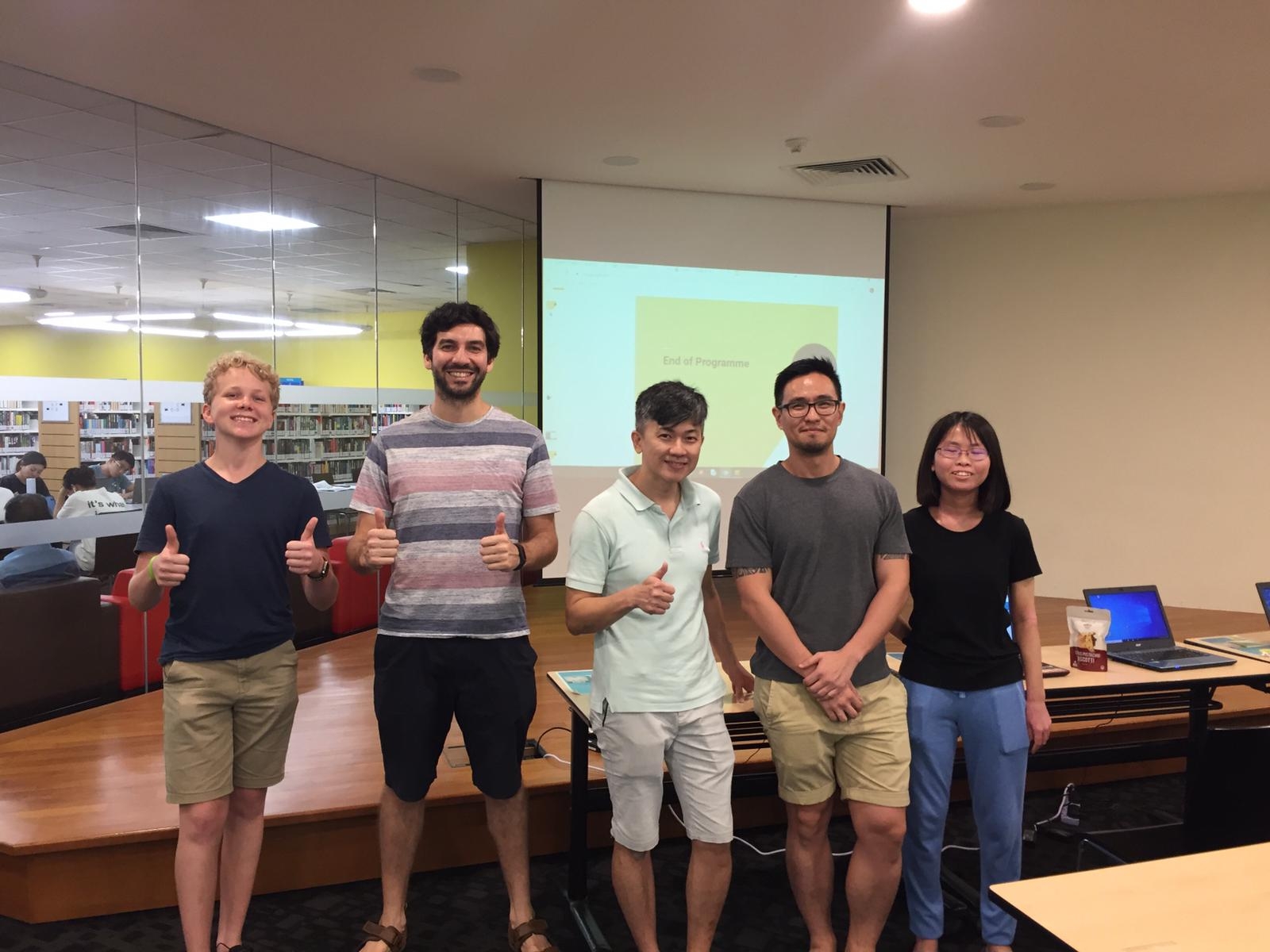
That’s Quinten all the way on the left, celebrating the last day of class at Code in the Community with his team!
Just 12 years old, Quinten has big dreams of using his coding superpowers to give back, and has already started to do so by volunteering as a teaching assistant for Code in the Community which brings free coding classes to kids from lower-income families.
But enough from us – let’s hear from him!
Hey Quinten! How did you get started with coding?
“I love playing video games, as most kids my age do. But beyond that I really wanted to figure out how they were developed and engineered, so then I started getting into coding.”
What does coding mean to you?
“Telling your computer to do certain things… I’d say coding is using logic to create something that works – stuff that people can use – on multiple devices.
There’s no point in creating something that no one will enjoy using.”
Can you tell us about a coding project that you enjoyed creating?
“I made my sister this music player thing on Scratch because she wanted to listen to music and we didn’t have Spotify, so I got a few songs and put them onto Scratch. Unfortunately there was a song upload limit!”
How do you deal with problems that crop up when you’re coding?
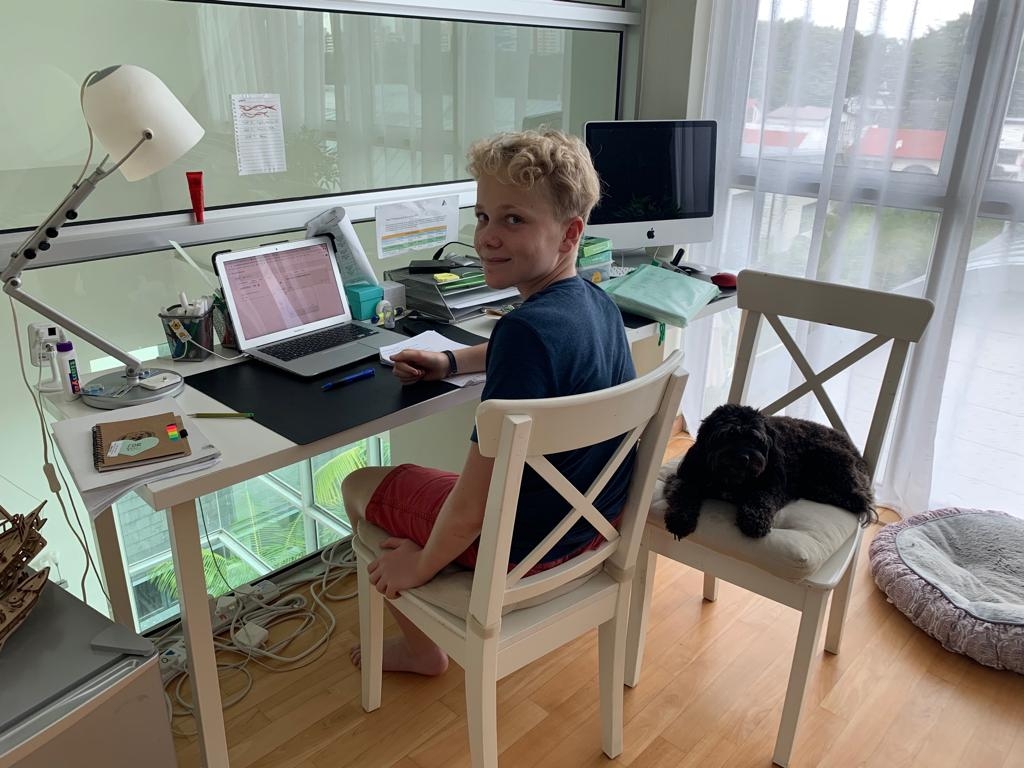
Quinten at home
“I try to stop and think of what I did wrong. But sometimes if it’s a really big problem, I have a small mental breakdown. If it’s a type error then I look it up and try to find out what’s wrong, and sometimes I just have to re-write the whole thing because of that single error. “
If you could invent anything in the world with your coding superpowers, what would it be?
“I’d invent a cheaper cochlear implant, for people who are deaf like me, but under-privileged.
The problem is that people who are under-privileged don’t have the ability to afford a device like the cochlear implant which is very expensive, so they might need to go for cheaper options that don’t work as well. So I’d like to create a cheap option that works just as well as the expensive option.
It’s a very big step, and will take some time, but maybe I could be the first.”
If you could set 1 rule for people all over the world, what would it be?


“You’re not allowed to give up.
If you’re stuck on something, just shut down your computer and don’t look at it for the rest of the day. Have a good sleep, then open it again. Calm down, research your problem, and once it’s solved, relish the satisfaction of having solved it by yourself and the fact that you didn’t give up. Even if it wasn’t what you expected, it still works. Anything that works, works – that’s the first step. And then you improve it.
There’s no such thing as the best, only better.”
Do you have any advice for kids who want to start coding?
“Start with Scratch! Don’t try to jump straight to the complicated stuff. Once you’re confident with Scratch, create custom blocks, incorporate scripts in Scratch and then move on. Once you get the hang of the complexity of Scratch, then it gets easier to pick up other things.
Oh, and be logical! Think out of the box. Think what would happen if I did this or that? What’s the possible outcome? Think through your options before you start coding.”
. . .
At Saturday Kids, our students don’t just learn to code. They code to learn. If you have a story to share about your kid’s experience with us, we’d love to hear from you! Please get in touch at hello@saturdaykids.com.
The post Kids of Saturday Kids: Quinten Buwalda – a 12 year old coder with big dreams and a big heart! appeared first on Saturday Kids | Coding, Digital Literacy for Kids & Parents.
]]>The post Emmanuel Soon: I taught myself to code appeared first on Saturday Kids | Coding, Digital Literacy for Kids & Parents.
]]>Over the last few years, our team here at Saturday Kids has been inspired by many students who have joined our coding classes, each exemplifying what we at Saturday Kids stand for – being Curious, Inventive, and Resourceful. In this series of conversations with our students, we look at each of their individual journeys and also hear what they have to say about their learning experience so far.
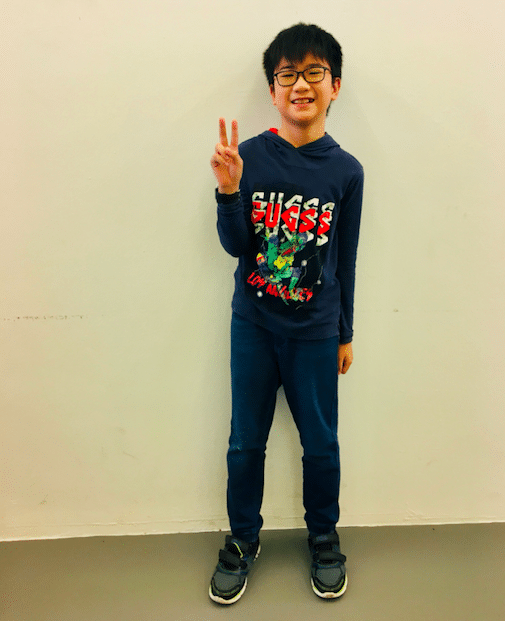
One of our newest and most self-directed kids, Emmanuel Soon (age 10) picked up coding through a book! With minimal on-screen experience, most of what he knew of Scratch before he joined Saturday Kids was self-taught and picked up through reading. His instructor described him as Mike Ross Jr (from Suits, if you get the reference!) This Nov-Dec, Emmanuel enrolled in our Intermediate Scratch camp, Game On. He shares with us how he started coding, the challenges he faced, and what he’s planning to do next.
Saturday Kids: Hello Emmanuel, tell us a bit about your interests – what do you like to do when you’re not in school?
Emmanuel: Hello, my name is Emmanuel, I’m 10 years old and I like to doodle in my free time. I also read a lot!
SK: Oh wow, so a little birdie told me that you learnt Scratch by reading a book. Is that true?
Emmanuel: Yes, that’s what I did. I found a general book about Scratch & Python which looked interesting. As I read that I thought, “Hey, that’s nice” so I asked my parents if we could try out Scratch. We went to the Scratch website and had a look at it.
SK: Where did you find this book? In the library?
Susan (Emmanuel’s mother): Popular. He didn’t buy the book at first. He kept going there to steal 10-15 mins to read the book until I decided to just get it for him because we kept having to go back to Popular so often!
Eventually I decided to send him for a Scratch camp because I didn’t know if what he was reading was right. I mean, how do you understand the program if you don’t actually use it. We restrict his computer time at home so he doesn’t get a lot of time online.
SK: So what got you interested in coding? Why did you feel like you wanted to read about Scratch or try this out?
Emmanuel: That’s a hard question…I thought it looked quite fun and I thought maybe I could just try it out and if it’s not fun I could stop.
SK: Was that the only book you’d read? Because honestly it’s quite amazing if you picked up Scratch from just one book!
Emmanuel: No, I read a few books but i really enjoyed that one the most.
Susan: I wasn’t going to buy him so many books in one go so I just asked him to choose 1. Eventually I decided to send him for a Scratch camp because I didn’t know if what he was reading was right. I mean, how do you understand the program if you don’t actually use it. We restrict his computer time at home so he doesn’t get a lot of time online.
SK: How did you feel then when you made your first project?
Emmanuel: It felt great! Like hey, I finally created my own game!
SK: Was it hard? It’s very different reading about something versus finally doing it. How was that experience?
Emmanuel: The first project was very hard. I created a game about a dinosaur chasing a cat. I only used a few simple blocks but I took 15 minutes to put the whole thing together!!
SK: …that’s very fast for a first project!
Susan: That’s because he only gets 15 minutes on the computer! (laughs) So that was what he had to work with. Sometimes during dinner he just sits there and thinks of exactly what he wants to do once he’s on the computer.
Emmanuel: I made other games after that with the help of my book. Once I was done with the book, I closed it and then went back to think about all the things I wanted to fix in my project and then tried to do it without the book. But sometimes I had to refer back to the book to fix some of the bugs.

SK: So what was it like coming for camp, where you had 3 hours everyday on the computer to create these projects instead of the 15 minute bursts you usually have at home?
Emmanuel: Awesome!!! Having an instructor definitely helps a lot.
SK: What was the biggest challenge you faced when you were creating your project?
Emmanuel: For my flappy bird game, the biggest challenge I faced was with the pipes. They were getting too predictable and then I ended re-doing the project. So it was mostly a lot of trial and error.
SK: How do you feel now, having continued with Scratch and learning these new skills?
Emmanuel: I’m a lot happier now! I’m definitely better at logical thinking now because you need to really think about the different blocks in Scratch and how they work off each other. I have a sense of satisfaction now because I’ve completed Scratch and now I’m moving on to a higher level, which is Python. I still have the book and I’ve already picked up a bit just from that.
SK: Is Python your next step? But are you going to keep working on your Scratch though?
E: I don’t know yet, but Python is more real-world programming. No one who’s 50 years old is still programming with Scratch! When I look at other projects it’s all 01010 and other things. It looks very hard, but i want to learn. Also, I’m still a single-finger typer. Everyone in my class is usually already done typing and they’re waiting for me to finish and I’d slowly type with one finger at a time.
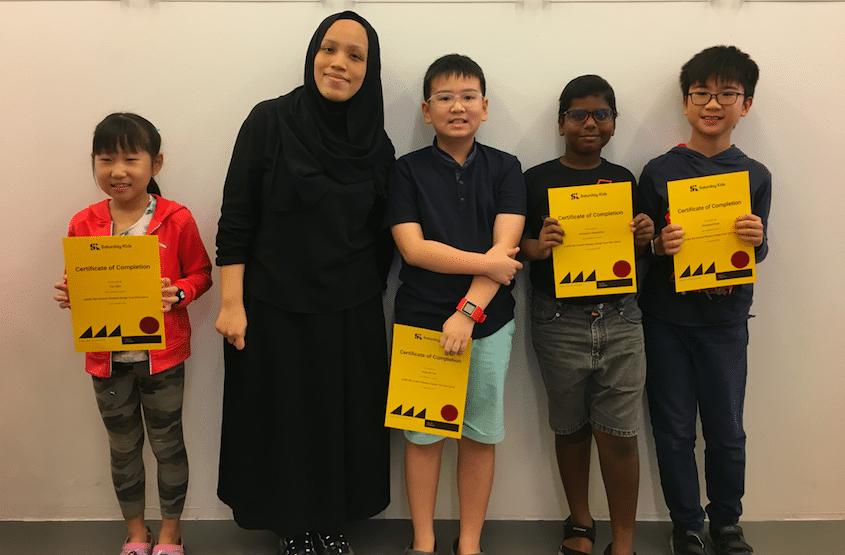
SK: Well, everyone starts somewhere and it’s great you’ve caught up with the rest of your classmates! So is this something you’d encourage your friends to try out?
Emmanuel: Yes, I would because it’s about games! So even if they’re bad at scratch, they’d be like, ‘I must program, because games!!’
SK: Alright, last one: Tell me one thing that you loved about camp and one thing that you would change
E: I really enjoyed the instructor, she helped me a lot. One thing to change…there’s nothing much to change but I wish classes were longer!!! 
…
It was a joy to meet Emmanuel, someone who really exemplifies what a self-directed learner is. At Saturday Kids, our students don’t just learn to code. They code to learn. We cannot teach kids everything there is to know. But what we can do is bring out the curiosity in kids, encourage them to look at problems and think “I can figure this out myself”
Help your child discover the joy of coding and become a self-motivated learning through our weekly coding workshops. Let them experience the happiest 2 hours of their week! Details here.
If you have a story to share with us about how your kid’s experience was, we’ll be happy to hear from you! Please get in touch at hello@saturdaykids.com.
The post Emmanuel Soon: I taught myself to code appeared first on Saturday Kids | Coding, Digital Literacy for Kids & Parents.
]]>The post Parent Perspectives: Why It’s Important to Let Your Kids Try appeared first on Saturday Kids | Coding, Digital Literacy for Kids & Parents.
]]>- Kids learn best through play
- Curiosity is at the heart of that (Here’s an interesting post by John on this!)
- Every child is different. Every kid has their own interests and things they’re good at
- The learning journey is just as important (if not more) than the final outcome.
That last point is what we want to work at: we don’t just want every kid to eventually discover for themselves something they’re good at, but to enjoy the process while doing it: we want to put the fun back into learning.
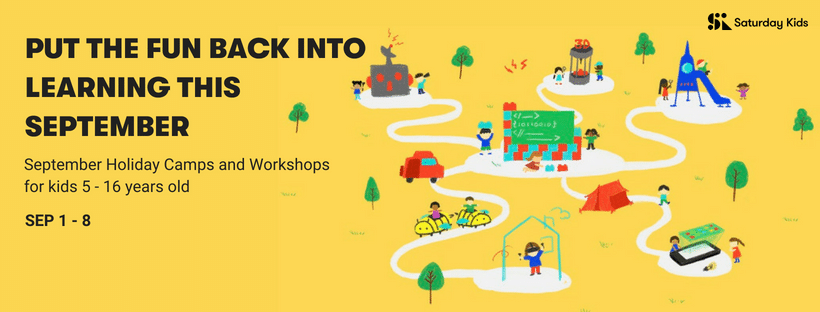
This September, we hope to put the fun back into learning with our series of 5-day camps and 3-hour workshops: check out our schedule here. We’ve sharedearlier how our goal at Saturday Kids is to make learning as fun as possible and giving kids the space to enjoy the process without being being too results-oriented.
I’ve spoken to many parents over the years who’ve felt the same; one of them is Saika Rahman, mother to Zarrar (age 5). She shared with us the challenges of keeping up with a precocious preschooler and how she does it.
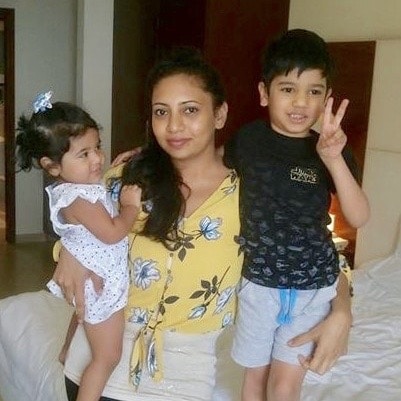
We took Zarrar out of kindergarten earlier this year because we felt he needed a more flexible, challenging and stimulating learning environment. He goes to few different classes and we still follow the MOE curriculum but add in things that Zarrar is interested in like science and tech classes and drama. We’ve seen an amazing change in Zarrar. His teachers keep him challenged in the subjects he’s not too interested in and he gets to learn what he’s interested in and has a lot of unstructured play time when he can totally switch off and be a kid.
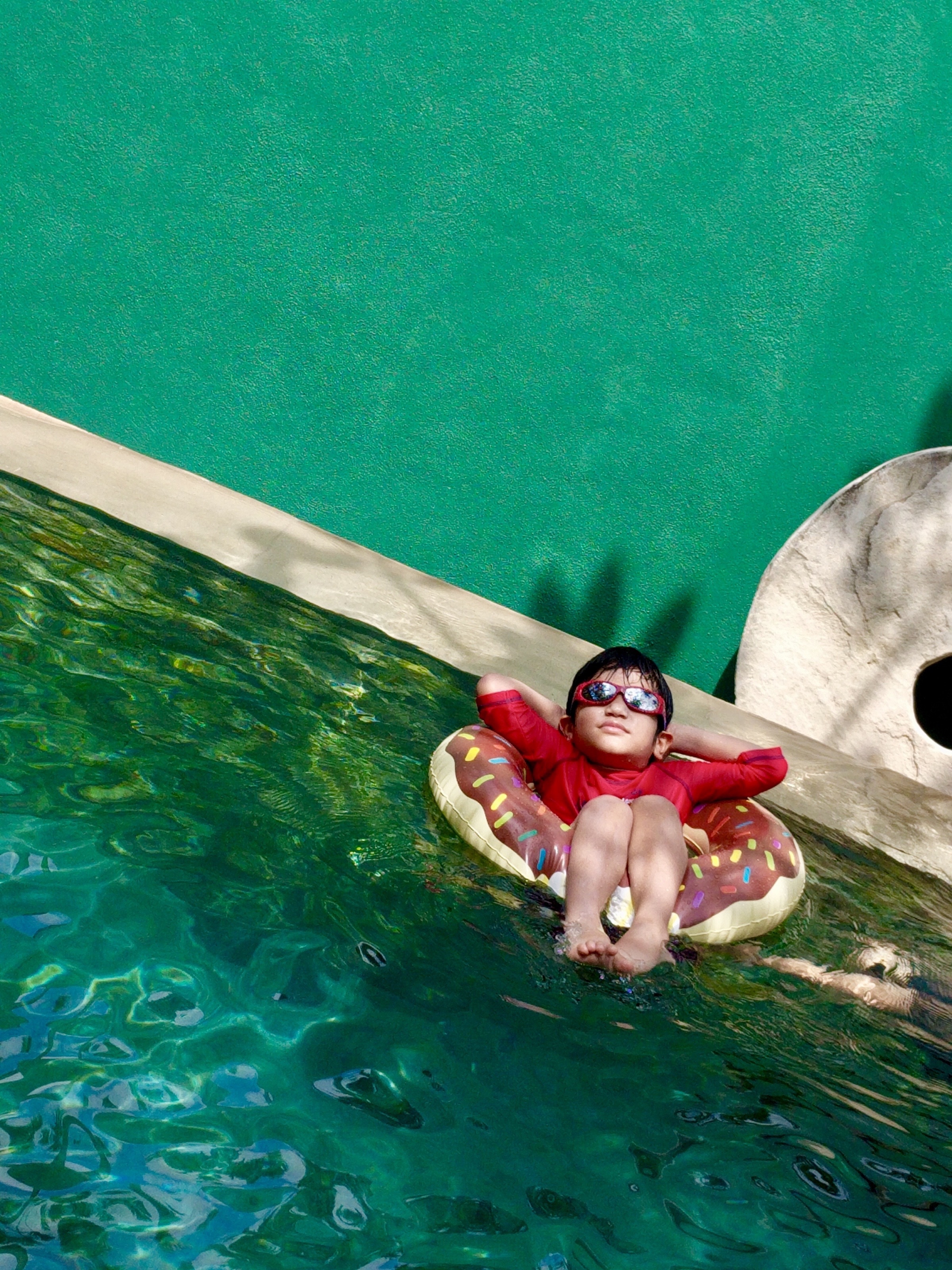
My husband is an engineer and I remember him always saying that coding really opened up his mind so I thought since Saturday Kids is right next to home, let me try it out. I saw a lot of things about Beebots in the Tiny Techies class – Zarrar is obsessed with robots, that’s how it all started. I signed him up because I thought coding could be a fun challenge and i wanted to open his mind to something that he’s never experienced.Plus he’s obsessed with robots and once he discovered how we could make robots move, that was it. We haven’t looked back since!
Like all children, Zarrar has always been very curious even as a baby. I have always been strict about screen time but at 22 months when he asked me “mama how to make boo” (he couldn’t say aeroplane!) i had no choice but to let him watch his first youtube video of how an aeroplane is built. He was totally mesmerized by it! I always saw that his curiosity came from within. He loves skyscrapers, titanic, helicopters and how these things are built. Wherever I could I would point these things out to him because that’s where his interest is.
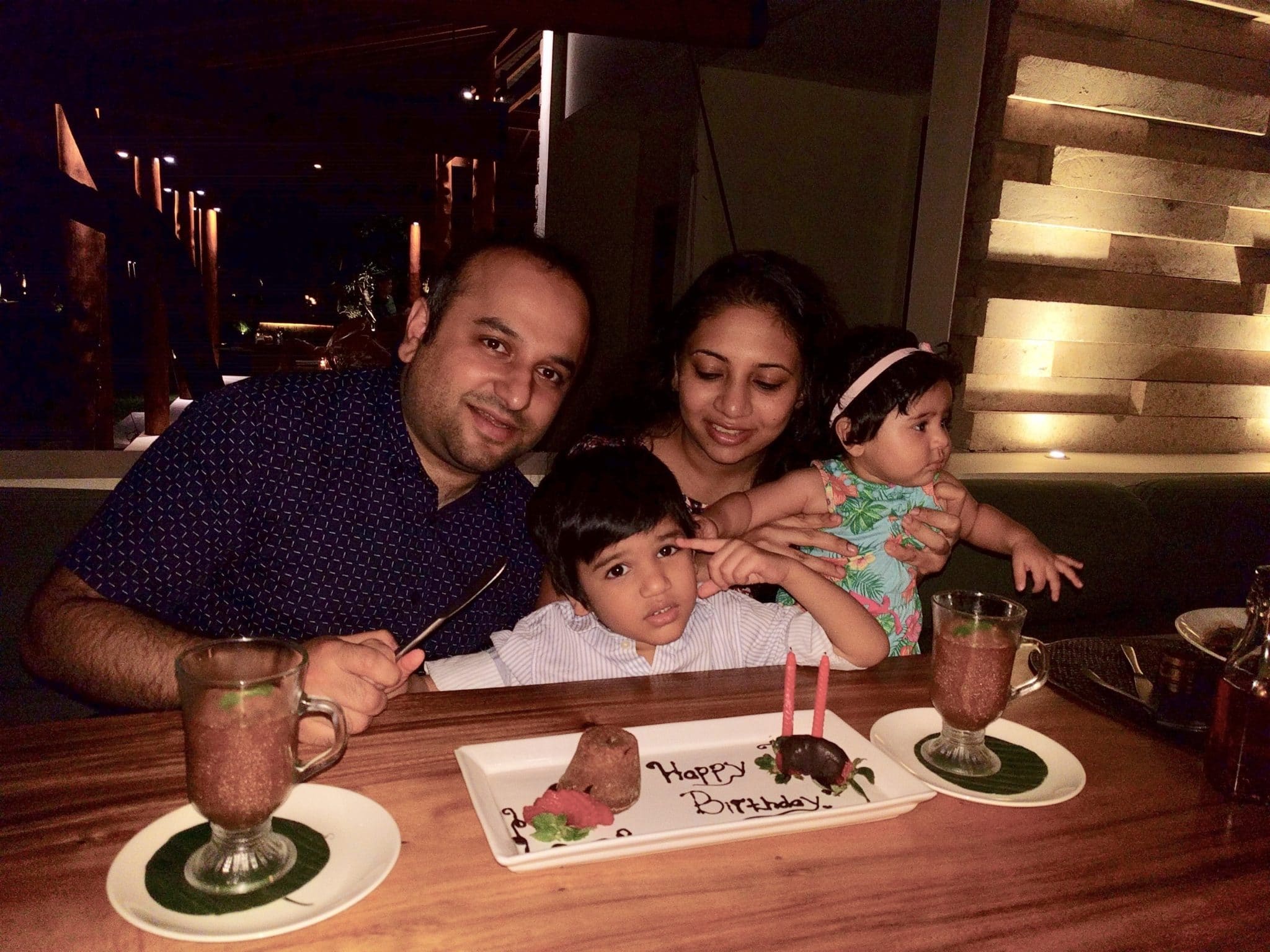
For now, we’ve decided to focus on a mix of classes that he needs to take, and those that he has shown an interest in. I really believe in exposure – if your kid has never been exposed to something, how will you know where their talent or interest is? I’ve tried international schools, bilingual schools, play-based schools etc but I find that they’re all the same in that they underestimate what our modern preschoolers can do. With exposure also comes confidence – the more things you do the more confident you become.
I believe in letting children experience things that they wouldn’t be exposed to in school, but also follows the child’s interests. I am completely against over scheduling but i believe it’s our responsibility to let the child explore an interest and let him/ her enjoy the process. That’s why we love the 8 weekly or intensive summer classes where we are exposed to quite a lot of information and then we get a term or two before we can enrol again. It’s great for them to experience something new every few months like a ballet or a drumming or a coding class and your child might just surprise you with a new talent or a hobby. I think we really underestimate them- they don’t have to pursue that class forever and ever but at least have them try a few classes out and let them choose if they want to continue or not.
Speaking to Saika was quite inspiring for me personally; Zarrar was enrolled in our Tiny Techies weekly classes and most recently in our Curious Cubs holiday camp. His instructor had nothing but positive things to say about him and it was, frankly speaking, refreshing to meet a mother who’s so proud of her child and equally encouraging of his need to not be the same as every other child.
Every kid is different so let’s give them the chance to discover what they’re good at – and have fun while doing it!
…
Put the fun back into learning for your kids with our series of 5-day camps and 3-hour workshops. Your kid may be new to programming, an inventor at heart, or on their way to becoming a programming pro – we’ve got something for everyone. Take your pick from our 5-day camps or 3-hour workshops and get coding!
Check out our schedule here.
The post Parent Perspectives: Why It’s Important to Let Your Kids Try appeared first on Saturday Kids | Coding, Digital Literacy for Kids & Parents.
]]>The post Saturday Kids team competes in Technovation appeared first on Saturday Kids | Coding, Digital Literacy for Kids & Parents.
]]>In March, 5 of our girls had the opportunity to do just that with Technovation.
Inspiring a Generation of Girls Toward Tech and Problem Solving
Technovation is a global technology challenge aimed at empowering girls; every year, Technovation invites teams of girls from all over the world to learn and apply the skills needed to solve real-world problems through technology.
Girls in the Technovation Challenge work in teams, with the help of mentors from the tech industry, on every step of the innovation process. Finalists are awarded scholarships and the opportunity to attend the World Pitch Summit in Silicon Valley.
This year, Saturday Kids had the opportunity to mentor a team of dedicated girls for Technovation!
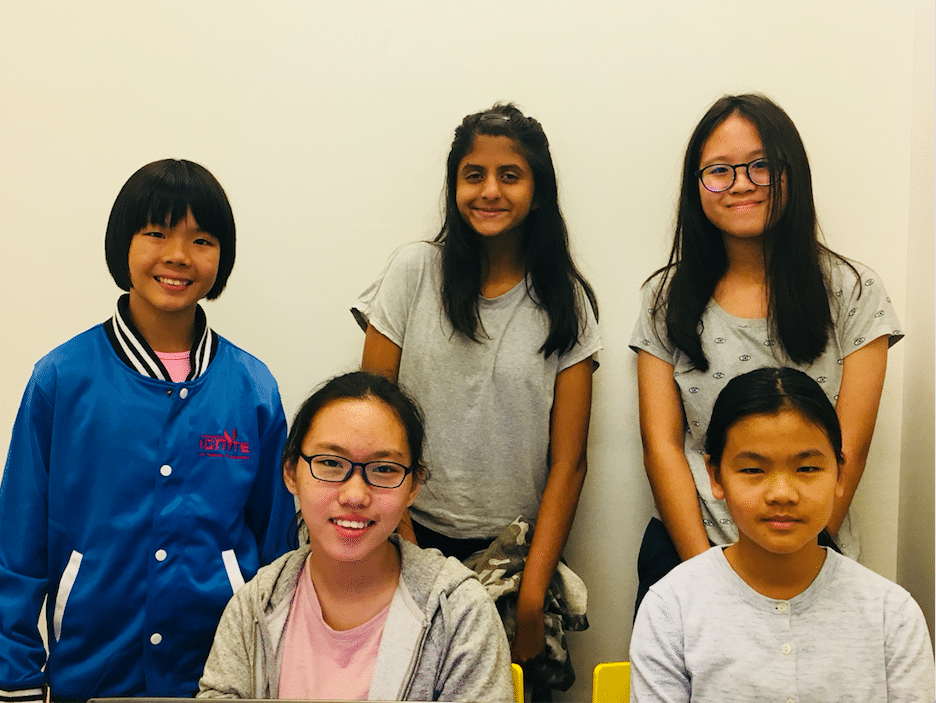 Meet (L-R, standing) Hai En, Chloe, Ashley, (L-R, sitting), Sunny & Rayna AKA The Saturday Kids!
Meet (L-R, standing) Hai En, Chloe, Ashley, (L-R, sitting), Sunny & Rayna AKA The Saturday Kids!
The Saturday Kids
The 5 girls, all age 13, first met back in early March and although things might have been slightly awkward in the beginning, because they didn’t really know each other, each of them had their own reasons for wanting to be a part of the team and to do something for their community, and that really helped them bond. Rayna, a budding writer and motivated coder, explained, “I want to be able to help others through coding, and I believe I will be able to do that with this programme. I would also like to seize the opportunity to hone my skills as a programmer.”
Over the course of 7 weeks, these dedicated young girls worked tirelessly not only on coding their app via the MIT App Inventor 2 platform, but also on their marketing skills with a pitch video and an app demo video.
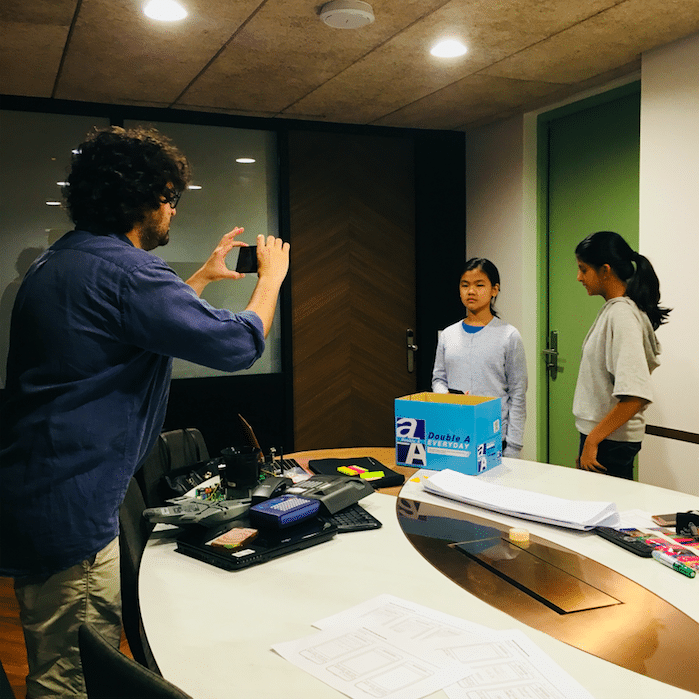
Filming in progress!
Tackling E-waste in Singapore
The girls decided to tackle the problem of e-waste in Singapore. Based on some preliminary research, they found that e-waste in Singapore is more often than not incinerated which has an adverse impact on the environment. They decided to work on building an app that would address this problem. In their own words, they wanted to “increase awareness of how e-waste is disposed of & its environmental impact, increase the percentage of e-waste being disposed of appropriately and to provide Singaporeans with an avenue through which they can dispose of their e-waste correctly”.
The girls worked tirelessly on their app, named E-cycle. There were 3 parts to it:
- Reaching out to companies who recycle electronic items
- Buying & selling unwanted electronic items;
- Increasing awareness of the problem of e-waste and its impact on the environment.
Our app will help speed up the process of recycling by enabling users to easily locate companies willing to recycle their electronic waste. Furthermore, users will be able to buy and sell unwanted electronic devices still in working condition. Users will also be able to view newspaper articles related to electronic waste.

A shot from E-cycle: Users are able to upload pictures of their e-waste online to sell
The girls coded the app themselves using a block-based coding programme; some had prior experience with mobile app development but the coding was still a challenge for them. Nevertheless with some help from their Saturday Kids mentors, they were able to build on their existing knowledge and code a much more complex app than they had originally thought they could. Some of them have even been inspired to keep coding – “It was quite challenging at first and we didn’t know where to begin but with the guidance of our mentors, we learnt a lot and it became a really meaningful experience. Plus we also had lots of fun doing it too!”.
The app is currently still in the prototyping phase but we’re exploring on how we can keep working on it and eventually get it up on the Google Play store so stay tuned for that!
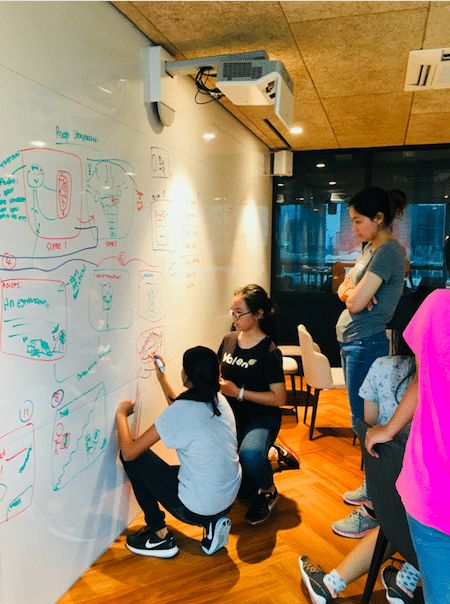
Working on their pitch video storyboard
Takeaways
The girls worked diligently to code their app to the best of their ability and submitted their project in end-April. At the end of it all, they were pretty happy with what they had managed to achieve. Hai En learnt that “nothing comes easy and we have to work hard to create something”, while Rayna reflected that “achievement and success take teamwork and perseverance”.

Technovation was an enlightening experience for the mentors as well however; mentor Sikieng was impressed by the commitment the team showed, “I feel very happy and proud to be journeying with this team because I know that these young girls will learn a lot from this experience. They learnt so much about entrepreneurship (from ideation to product development), and how to code. Plus they learnt how to lead and work as a team. Growing up, these are the kind of essential skills they will need through their lives.”
Sikieng was also the Ambassador for Technovation Cambodia in 2016 and has experience working with girls who are looking to make a difference. We’ll be sharing Sikieng’s experience with Technovation Cambodia sometime next month so keep an eye out for that!
Saturday Kids is proud of the team and wishes them all the best! We hope to keep inspiring and helping young girls pick up digital literacy skills and believe that whatever boys can do, they can do just as well, if not better.
The post Saturday Kids team competes in Technovation appeared first on Saturday Kids | Coding, Digital Literacy for Kids & Parents.
]]>